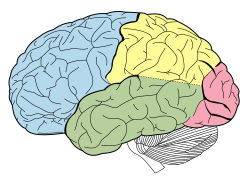psychology, temporal motivation theory (TMT) is an integrative motivational theory developed by Piers Steel and Cornelius J. König. The theory emphasizes...
5 KB (622 words) - 20:11, 27 January 2025
Goal setting (redirect from Goal-setting theory)
goal-setting theory lacks "the issue of time perspective". Taking this into consideration, Steel and Konig (2006) utilize their temporal motivation theory (TMT)...
90 KB (11,231 words) - 13:43, 22 May 2025
Content theory is a subset of motivational theories that try to define what motivates people. Content theories of motivation often describe a system of...
108 KB (14,244 words) - 06:15, 26 May 2025
human motivation, like expectancy theory, equity theory, goal-setting theory, self-determination theory, and reinforcement theory. Motivation is relevant...
145 KB (14,598 words) - 12:32, 12 May 2025
refer to: Tandem mass tag, a chemical label Temporal motivation theory, in psychology Terror management theory, in psychology Thermo-mechanical treatment...
2 KB (206 words) - 23:03, 26 April 2025
Procrastination (category Motivation)
integrates several core theories of motivation as well as meta-analytic research on procrastination is the temporal motivation theory. It summarizes key predictors...
57 KB (6,261 words) - 16:47, 21 May 2025
Opponent-Process Theory of Motivation: I. Temporal Dynamics of Affect. Psychological Review, 81, 2, pp. 119–145. Solomon's "Opponent Process" Theory Description...
15 KB (1,958 words) - 01:15, 26 May 2025
concerned with the theory of the categorical syllogism, there are passages in his work that are now seen as anticipations of temporal logic, and may imply...
33 KB (3,812 words) - 22:37, 13 May 2025
Hyperbolic discounting (category Decision theory)
test theories of how and when this learning occurs (e.g. Ainslie, 2012). Akrasia Deferred gratification Intertemporal choice Temporal motivation theory Time...
30 KB (3,977 words) - 16:32, 25 May 2025
cortex (mPFC), the posterior superior temporal sulcus (pSTS), the precuneus, and the amygdala are associated with theory of mind tasks. Patients with frontal...
136 KB (17,082 words) - 16:28, 29 May 2025
Socioemotional selectivity theory (SST; developed by Stanford psychologist Laura L. Carstensen) is a life-span theory of motivation. The theory maintains that as...
14 KB (1,708 words) - 13:56, 24 May 2025
Scale space (redirect from Scale space theory)
processing communities with complementary motivations from physics and biological vision. It is a formal theory for handling image structures at different...
53 KB (6,616 words) - 20:38, 9 May 2025
Human intelligence (redirect from Motivational intelligence)
humans, which is marked by complex cognitive feats and high levels of motivation and self-awareness. Using their intelligence, humans are able to learn...
84 KB (10,035 words) - 20:58, 22 May 2025
science, network theory is a part of graph theory. It defines networks as graphs where the vertices or edges possess attributes. Network theory analyses these...
35 KB (3,952 words) - 17:42, 23 May 2025
Cognitive dissonance (redirect from Cognitive dissonance theory)
ProQuest 1906281562. Heider F (1960). "The Gestalt Theory of Motivation". In Jones MR (ed.). Nebraska Symposium on Motivation. Vol. 8. Lincoln: University of Nebraska...
129 KB (15,614 words) - 16:01, 22 May 2025
Hedonism (redirect from Motivational hedonism)
that prioritize pleasure. Psychological hedonism is the theory that the underlying motivation of all human behavior is to maximize pleasure and avoid...
93 KB (9,703 words) - 04:56, 30 May 2025
Classical conditioning (redirect from Stimulus-response theory)
elicit pulses of increased motivation to consume their UCS reward, whetting and intensifying the appetite. However, the motivation power is never simply in...
66 KB (8,779 words) - 22:17, 23 April 2025
Pleasure (section Motivation and behavior)
labels "present bias" or "temporal discounting", refers to our tendency to violate temporal neutrality in regards to temporal distance from the present...
46 KB (6,248 words) - 19:17, 23 May 2025
and motivation, social development, and neuroscientific model of social interaction" (Van Lange & Balliet, 2014, p. 67). In addition, the theory provides...
22 KB (3,014 words) - 18:57, 15 May 2025
Yerkes–Dodson law (redirect from Arousal theory)
persistence may be performed better with higher levels of arousal (to increase motivation). Because of task differences, the shape of the curve can be highly variable...
7 KB (903 words) - 08:19, 25 April 2025
single instant of time; instead, some temporal parts is said to be present. Sometimes, especially in the theory of relativity as it is expressed by Minkowski...
28 KB (4,527 words) - 21:21, 1 May 2025
Confabulation (section Temporality theory)
causes the distortion. Self-identity theories posit that people confabulate to preserve themselves. The temporality theory believes that confabulation occurs...
48 KB (5,587 words) - 08:20, 25 May 2025
Time (redirect from Temporal construct)
philosophy, and science. Temporal measurement has occupied scientists and technologists, and has been a prime motivation in navigation and astronomy...
123 KB (14,106 words) - 11:30, 24 May 2025
Time perception (redirect from Temporal illusion)
intervals with fewer changes Perceived temporal length of a given task may shorten with greater motivation Perceived temporal length of a given task may stretch...
86 KB (10,093 words) - 23:16, 23 May 2025
Flow (psychology) (redirect from Theory of Flow)
deep learning.[citation needed] Motivation and well-being: Flow state theory emphasizes the role of intrinsic motivation in optimal performance and well-being...
98 KB (11,974 words) - 13:47, 22 May 2025
Scalar expectancy (redirect from Scalar expectancy theory)
animal timing behavior. John Gibbon originally proposed SET to explain the temporally controlled behavior of non-human subjects. He initially used the model...
7 KB (946 words) - 17:54, 31 October 2024
Formal concept analysis (category Lattice theory)
biology. The original motivation of formal concept analysis was the search for real-world meaning of mathematical order theory. One such possibility of...
47 KB (5,372 words) - 10:00, 22 May 2025
Elaboration likelihood model (section Motivation)
knowledge. Attitudes towards a message can affect motivation. Drawing from cognitive dissonance theory, when people are presented with new information (a...
127 KB (16,689 words) - 09:08, 28 May 2025
Goal (category Management theory)
(September 2002) [2002]. "Building a practically useful theory of goal setting and task motivation: a 35-year odyssey". American Psychologist. 57 (9): 705–717...
27 KB (3,245 words) - 06:24, 26 May 2025
Frontal lobe (section Theories of function)
lobe and the temporal lobe). It is parted from the parietal lobe by a groove between tissues called the central sulcus and from the temporal lobe by a deeper...
22 KB (2,702 words) - 21:33, 24 May 2025






